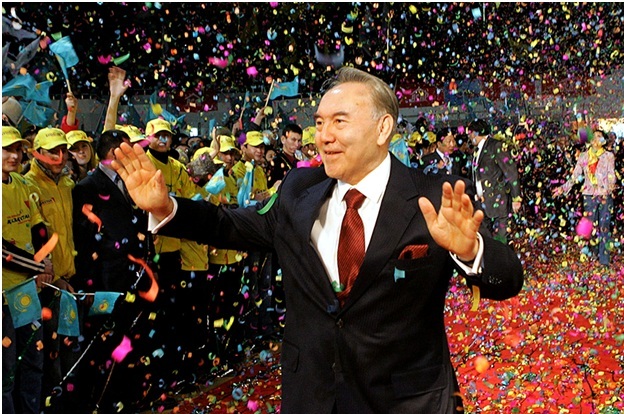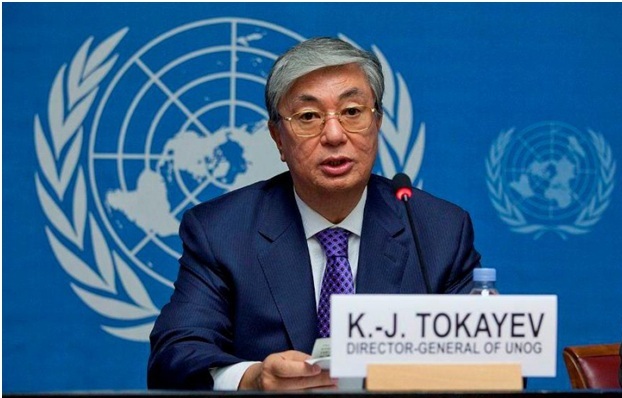Tariq Saeedi
Nursultan Nazarbayev, the hugely popular and very successful president of Kazakhstan since independence has decided to step down.
In a televised address on 19 March 2019, he said that he has resigned from his post and will hand over the power to the chairman of the senate, Kassym-Jomart Tokayev on 20 March 2019.
The next presidential elections were scheduled for April 2020. Till then, Tokayev will serve as the acting president.
One of Mr Nazarbayev’s closest allies, Mr Tokayev has held top posts in government since Kazakhstan’s independence and has the experience to manage an orderly transfer of power without disrupting the status quo. Fluent in Russian, English and Chinese, he is also well known in foreign capitals from his time both as foreign minister, the UN undersecretary general, and Kazakhstan’s representative at the United Nations.
Nazarbayev is vacating the office of the president but he will retain the chairmanship of the national Security Council, of which he is the chairman for life. He will also remain the head of the ruling Nur Otan Party which has the majority in the parliament. Nazarbayev is elbasy (leader of the nation), a title bestowed upon him by the parliament in 2010.
* * *
Nazarbayev is popular across the entire spectrum of the society, in good health, and firm control of the political system. He is 78 but there has been no sign of his being tired or slowing down.

The question is, why has he decided to step down and how the situation may pan out?
His stepping down is attributed by some commentators to the current economic difficulties of Kazakhstan and some incidents of protest. — This is the case of looking from the wrong end of the telescope.
Nazarbayev is a man of crisis. He has proven throughout his long career as a politician that he always finds a way to seize the best possible outcome in any given situation.
The current economic problems are a product of the phenomenon that is global in nature and has nothing to do with any flaws in the policies of the government. Even then, Kazakhstan is steadily coming out of the crisis and the outlook is definitely promising.
As far as the protests are concerned, they were aimed at certain conditions and not at Nazarbayev as the president. People have trust in him and this was confirmed when he listened to the people and sacked the government last month because of its somewhat inadequate performance. The decisions of Nazarbayev have always been in synch with the aspirations of the people.
* * *
What is immediately clear is that Nazarbayev is transforming his role, not eliminating it.
The examples of Singapore and Malaysia come to mind.
In Singapore, Lee Kuan Yew, the prime minister from 1959 to 1990, steered the country from a resource-poor island to one of the most powerful economies in the world. After leaving the office he continued to play a significant role in policy-making for another twenty-one years, first as senior minister and then as minister mentor.
In Malaysia, Dr. Mahathir bin Mohamad was the prime minister from 1981 to 2003, raising the country from poverty to prosperity. Even after leaving the active politics, the popularity of Mahatir Mohamad remained undiluted. He returned to office 2017.
Nazarbayev as the chairman of the national security council and the head of the Nur Otan Party will have a prominent role in the national life.
Explaining the reason for his decision to step down, Nazarbayev said in his televised address that he would like to create the space for the next generation of leadership.
The parliamentary elections are also scheduled for April next year and there is a period of more than a year to identify and encourage the next generation of leaders to contest their way into the parliament. Perhaps this is one of the areas where Nazarbayev will focus his energies and experience.
* * *
Creating the space for the next generation of leadership is the prime objective but the timing of the decision will have some additional benefits.
There is a period of more than year before the nation goes to polls for the next president (and the parliament).
Nazarbayev is a statesman of global stature. The next president will need to be someone who is as comfortable in sitting down with the likes of Putin and Xi Jinping, can maintain the balance of relations with the major powers, and capable of quick and correct decisions in the times of crisis.

The acting president of Kazakhstan for the interim period, Kassym-Jomart Tokayev seems the most likely candidate to fill the position. For the next twelve months, he will be under watchful eye of the nation, and the world. It can be expected that the Nur Otan Party will feel confident in presenting him as the candidate for the next presidential elections.
* * *
The government of Kazakhstan has assured that all the domestic and foreign policies will remain in place. There would be no major change, at least during the interim period. This will certainly include all the connectivity and integration processes in the region and beyond.
By stepping down voluntarily while still hugely popular, Nazarbayev has set a new precedent for the region. In the coming months, the effectiveness of the role played by Nazarbayev as national leader but not the president will help create a viable model of transition of power for the region. /// nCa, 20 March 2019